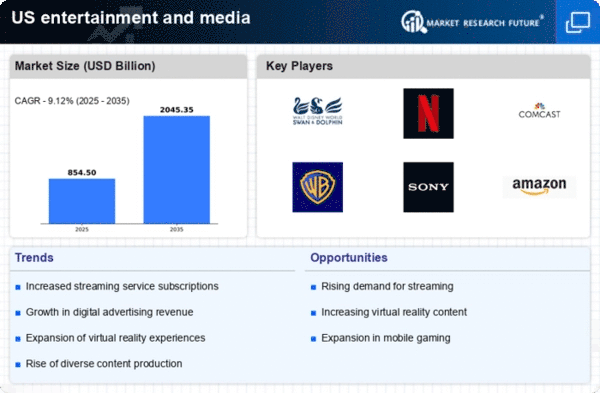Shifts in Consumer Behavior
Consumer behavior is undergoing notable shifts, significantly impacting the entertainment and-media market. The rise of on-demand content consumption has altered traditional viewing habits, with a growing preference for binge-watching and personalized content. Data indicates that around 70% of viewers in the US now prefer streaming services over traditional cable, reflecting a substantial change in media consumption patterns. Additionally, younger demographics are increasingly favoring mobile devices for content access, which is reshaping advertising strategies and content creation. This shift is likely to encourage media companies to invest more in mobile-friendly formats and interactive content, potentially leading to a 15% increase in mobile advertising revenue by 2026. As these trends continue to evolve, the entertainment and-media market must adapt to meet the changing preferences of its audience.
Regulatory Changes and Compliance
Regulatory changes are playing a crucial role in shaping the entertainment and-media market. Recent legislation aimed at data privacy and content regulation is influencing how companies operate within the industry. For instance, the implementation of stricter data protection laws is compelling media companies to enhance their compliance measures, which may incur additional costs. However, these regulations also present opportunities for companies to build consumer trust, potentially leading to increased customer loyalty. As of 2025, it is estimated that compliance-related expenditures in the entertainment and-media market could rise by 20%, reflecting the growing importance of adhering to legal standards. Consequently, companies that proactively adapt to these regulatory changes may gain a competitive edge in the evolving landscape.
Emergence of Niche Content Platforms
The emergence of niche content platforms is reshaping the landscape of the entertainment and-media market. These platforms cater to specific interests and demographics, allowing for more targeted content delivery. For instance, platforms focusing on genres such as horror, documentaries, or independent films are gaining traction among audiences seeking specialized content. This trend is evidenced by the fact that niche streaming services have seen a 25% increase in subscriptions over the past year. As consumers become more discerning in their content choices, the demand for tailored experiences is likely to grow, prompting established players to diversify their offerings. This shift not only enhances viewer satisfaction but also creates new revenue streams for content creators and distributors, thereby contributing to the overall growth of the entertainment and-media market.
Technological Advancements in Content Delivery
The entertainment and-media market is experiencing a transformative phase due to rapid technological advancements in content delivery. Innovations such as 5G technology and enhanced broadband capabilities are facilitating faster streaming and improved user experiences. As of 2025, approximately 80% of households in the US have access to high-speed internet, which is crucial for the consumption of high-definition content. This increased accessibility is likely to drive higher engagement levels among consumers, leading to a projected growth rate of 10% in the streaming segment alone. Furthermore, the integration of artificial intelligence in content recommendation systems is enhancing user satisfaction, thereby fostering loyalty and increasing subscription rates across various platforms. The entertainment and-media market is thus poised for significant growth as these technologies continue to evolve.
Integration of Social Media and Content Creation
The integration of social media platforms with content creation is significantly influencing the entertainment and-media market. Social media has become a vital tool for content distribution and audience engagement, allowing creators to reach wider audiences. As of 2025, nearly 60% of content creators in the US utilize social media for promotional purposes, indicating a shift in marketing strategies. This trend is likely to foster collaborations between traditional media companies and social media influencers, enhancing the visibility of new content. Furthermore, the rise of user-generated content is reshaping how audiences interact with media, leading to a more participatory culture. This integration not only drives engagement but also opens new avenues for monetization, thereby contributing to the dynamic growth of the entertainment and-media market.

















